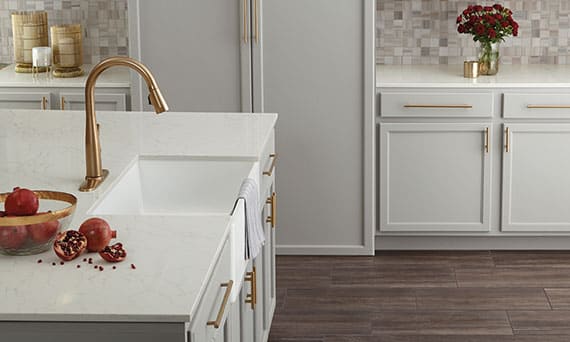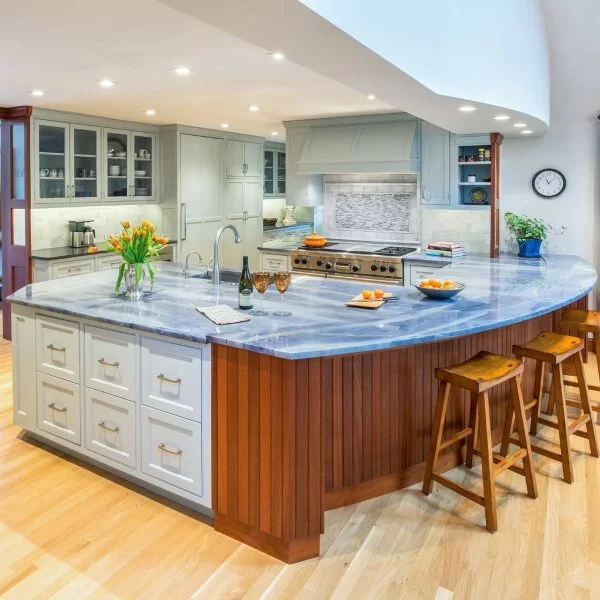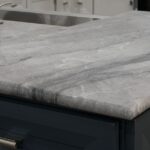Quartzite is gaining considerable popularity in the United States as a preferred countertop material, especially in comparison to marble for certain applications. This mostly originates from its similarity in appearance to marble, though with increased durability and resistance to staining and etching, besides a lesser cost. Many homeowners and designers have been drawn to quartzite for its luxurious look while appreciating its ability to withstand the rigors of daily use in kitchens and bathrooms better than marble. But what are the pros and cons of quartzite countertops?
In this guide, find out the main properties behind quartzite’s compositions and all the advantages it holds.
Read as well: A Complete Guide to Quartzite Countertop Sealers
Understanding the pros and cons of quartzite countertops
Quartzite countertops are natural stone surfaces made from quartzite – a metamorphic rock formed from sandstone. Through intense heat and pressure, sandstone transforms into quartzite, resulting in a hard, durable material that’s excellent for countertops.
Quartzite countertops are highly prized for their beauty – resembling marble in appearance but offering more durability – and come in various colors and patterns, showcasing unique veining and natural designs. These countertops are renowned for their heat resistance, scratching, and staining, making them popular for kitchens and bathrooms.

Now, remember that, despite similar names and appearance, quartz and quartzite represent two distinct categories of countertop materials.
Quartz countertops are engineered stone surfaces crafted from quartz crystals blended with resins and pigments – resulting in a non-porous, durable material with consistent patterns and colors. They require minimal maintenance, offering high resistance to stains and scratches. On the other hand, quartzite is a natural stone formed from sandstone subjected to heat and pressure, resulting in a harder material primarily composed of quartz crystals.
Quartzite countertops showcase unique patterns, colors, and veining akin to marble, providing a one-of-a-kind appearance. Nonetheless, while quartzite is highly durable against scratching and heat, it can be slightly porous, so it needs periodic sealing to prevent staining. Of course, this distinguishes it from the low-maintenance engineered quartz surfaces – but for many the long-lasting benefits compensate for the downsides.
Now it’s time for us to analyze the pros and cons of quartzite countertops. Are they worth it in the end? Well, from a professional standpoint above all, yes.
Pros of quartzite countertops
Quartzite countertops boast several advantages compared to other natural or engineered stones – check out below:
- Durability: Quartzite is extremely hard and durable, making it resistant to scratches, heat, and etching. It’s tougher than marble but has a similar aesthetic appeal.
- Unique appearance: Each slab of quartzite has its distinct patterns and colors, resembling marble but often with more durable properties. This uniqueness can add a luxurious and natural touch to any space.
- Heat resistance: Quartzite can withstand high temperatures, making it suitable for kitchen countertops where hot pans or pots might be placed directly on the surface.
- Low maintenance: While it requires periodic sealing to prevent stains and etching, quartzite generally requires minimal maintenance compared to some other natural stones like marble or limestone. Read our complete cleaning guide here.
- Variety: Quartzite comes in a wide range of colors and patterns, offering versatility in design options to suit different styles and preferences.
- Increased home value: Due to its durability and luxurious appearance, quartzite countertops can add value to a home, appealing to potential buyers.

However, there are some considerations. Despite its durability, quartzite can still be susceptible to scratches from sharp objects, and it’s essential to use cutting boards to protect the surface. Additionally, like most natural stones, the availability of certain colors and patterns may vary – which could affect its price and accessibility compared to engineered stones like quartz, which offer more consistency in appearance. These drawbacks are what we’d like to get into now.
Cons of quartzite countertops
While quartzite countertops have several advantages, there are some drawbacks to consider. Overall, while quartzite countertops offer numerous benefits, it’s essential to weigh these cons against the advantages and consider proper care and maintenance to ensure they remain in top condition for years to come.
- Porosity: Quartzite is a porous natural stone. Some varieties may be more porous than others, making them susceptible to stains from acidic substances like lemon juice, vinegar, or wine if not sealed properly. Regular sealing is essential to prevent these substances from penetrating the surface.
- Maintenance: Despite being low maintenance overall, quartzite requires periodic sealing to maintain its resistance to stains and etching. Failing to seal it regularly can lead to stains and compromise its appearance.
- Cost: Quartzite countertops can be more expensive than some other natural stones and most engineered stones like quartz. The price can vary based on rarity, color, and the intricacy of the veining.
- Limited availability: Certain colors and patterns of quartzite may be rare or more challenging to find, affecting availability and potentially leading to higher costs or longer wait times for installation.
- Susceptibility to scratching: While quartzite is durable, it’s not completely scratch-proof. Sharp objects or improper use can still cause scratches on the surface, so using cutting boards and avoiding abrasive cleaners is important.
- Professional installation: Due to their weight and sometimes delicate nature, quartzite countertops require professional installation, adding to the overall cost. And speaking of professional installation…
Eagle Stones has top-quality quartzite countertops for you!
Now you know the pros and cons of quartzite countertops!
If you live near Sarasota, Florida, we have the right catalog of quartzite countertops for you. We work with a variety of natural stones from all over the world – including granite, marble, onyx, and quartzite. We can even go to your home to give you a free estimate!
Get in contact with our team to start planning your next project today!



